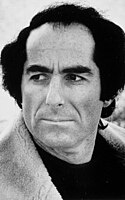Philip Roth Quote
Under the sad end-of-days spell of the smoky dusk and the waning year, of the moon and its ostentatious superiority to the trashy, petty claptrap of his sublunar existence, why does he even hesitate? The Kamizakis are your enemies whether you do or not, so you might as well do it. Yes, yes, if you can still do something, you must do it - that is the golden rule of sublunar existence, whether you are a worm cut in two or a man with a prostate like a billiard ball. If you can still do something, then you must do it! Anything living can figure that out.
Philip Roth
Under the sad end-of-days spell of the smoky dusk and the waning year, of the moon and its ostentatious superiority to the trashy, petty claptrap of his sublunar existence, why does he even hesitate? The Kamizakis are your enemies whether you do or not, so you might as well do it. Yes, yes, if you can still do something, you must do it - that is the golden rule of sublunar existence, whether you are a worm cut in two or a man with a prostate like a billiard ball. If you can still do something, then you must do it! Anything living can figure that out.
Related Quotes
About Philip Roth
Philip Milton Roth (March 19, 1933 – May 22, 2018) was an American novelist and short-story writer. Roth's fiction—often set in his birthplace of Newark, New Jersey—is known for its intensely autobiographical character, for philosophically and formally blurring the distinction between reality and fiction, for its "sensual, ingenious style" and for its provocative explorations of American identity. He first gained attention with the 1959 short story collection Goodbye, Columbus, which won the U.S. National Book Award for Fiction. Ten years later, he published the bestseller Portnoy's Complaint. Nathan Zuckerman, Roth's literary alter ego, narrates several of his books. A fictionalized Philip Roth narrates some of his others, such as the alternate history The Plot Against America.
Roth was one of the most honored American writers of his generation. He received the National Book Critics Circle award for The Counterlife, the PEN/Faulkner Award for Operation Shylock, The Human Stain, and Everyman, a second National Book Award for Sabbath's Theater, and the Pulitzer Prize for American Pastoral. In 2001, Roth received the inaugural Franz Kafka Prize in Prague. In 2005, the Library of America began publishing his complete works, making him the second author so anthologized while still living, after Eudora Welty. Harold Bloom named him one of the four greatest American novelists of his day, along with Cormac McCarthy, Thomas Pynchon, and Don DeLillo. James Wood wrote: "More than any other post-war American writer, Roth wrote the self—the self was examined, cajoled, lampooned, fictionalized, ghosted, exalted, disgraced but above all constituted by and in writing. Maybe you have to go back to the very different Henry James to find an American novelist so purely a bundle of words, so restlessly and absolutely committed to the investigation and construction of life through language... He would not cease from exploration; he could not cease, and the varieties of fiction existed for him to explore the varieties of experience."
Roth was one of the most honored American writers of his generation. He received the National Book Critics Circle award for The Counterlife, the PEN/Faulkner Award for Operation Shylock, The Human Stain, and Everyman, a second National Book Award for Sabbath's Theater, and the Pulitzer Prize for American Pastoral. In 2001, Roth received the inaugural Franz Kafka Prize in Prague. In 2005, the Library of America began publishing his complete works, making him the second author so anthologized while still living, after Eudora Welty. Harold Bloom named him one of the four greatest American novelists of his day, along with Cormac McCarthy, Thomas Pynchon, and Don DeLillo. James Wood wrote: "More than any other post-war American writer, Roth wrote the self—the self was examined, cajoled, lampooned, fictionalized, ghosted, exalted, disgraced but above all constituted by and in writing. Maybe you have to go back to the very different Henry James to find an American novelist so purely a bundle of words, so restlessly and absolutely committed to the investigation and construction of life through language... He would not cease from exploration; he could not cease, and the varieties of fiction existed for him to explore the varieties of experience."
